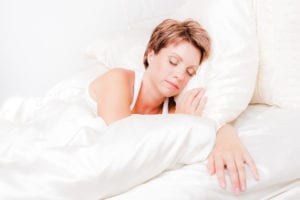Written by Angeline A. De Leon, Staff Writer. Supplementation with melatonin significantly reduced anxiety and fatigue and significantly improved sleep quality in participating subjects compared to control.
 Among the numerous health conditions resulting from Traumatic Brain Injury (TBI), one of the most overlooked is perhaps sleep disturbance. Persistent sleep disorders like insomnia contribute to ongoing cognitive difficulties and functional impairment in patients with TBI 1,2, negatively affecting productivity and quality of life. The current literature suggests that TBI may be linked to a delayed melatonin profile 3 such that melatonin production in TBI patients is reduced in the evening as well as overnight 4. While hypnotics such as benzodiazepines and non-benzodiazepines have been generally effective in improving sleep quality of TBI patients 5, long-term efficacy and safety is unknown in this vulnerable population. Given the safety profile of melatonin and its anxiolytic and sleep-promoting effects 6, researchers in Australia sought to confirm whether restoring melatonin levels in TBI patients through supplementation could alleviate sleep disturbance and improve sleep quality.
Among the numerous health conditions resulting from Traumatic Brain Injury (TBI), one of the most overlooked is perhaps sleep disturbance. Persistent sleep disorders like insomnia contribute to ongoing cognitive difficulties and functional impairment in patients with TBI 1,2, negatively affecting productivity and quality of life. The current literature suggests that TBI may be linked to a delayed melatonin profile 3 such that melatonin production in TBI patients is reduced in the evening as well as overnight 4. While hypnotics such as benzodiazepines and non-benzodiazepines have been generally effective in improving sleep quality of TBI patients 5, long-term efficacy and safety is unknown in this vulnerable population. Given the safety profile of melatonin and its anxiolytic and sleep-promoting effects 6, researchers in Australia sought to confirm whether restoring melatonin levels in TBI patients through supplementation could alleviate sleep disturbance and improve sleep quality.
In a randomized, double-blind, placebo-controlled, cross-over study 7, a total of 33 patients with mild to severe TBI reporting sleep disturbances post-injury were enrolled (average age = 37 years). Participants were randomly assigned to a four-week regimen of melatonin (2 mg of prolonged-release melatonin formulation) or placebo treatment before crossover to the alternate treatment arm (treatment periods were separated by 48-hour washout period). Patients were instructed to orally ingest one capsule at about the same time each night, within two hours of initiating sleep. Primary outcome for sleep quality was evaluated using the Pittsburgh Sleep Quality Index (PSQI), and sleep onset latency was measured by wrist actigraphy (assessing time elapsed between start of rest interval relative to sleep start time). Participants also completed a sleep diary to document subjective sleep quality, as well as the Short-Form Health Survey (SF-36 v1), Hospital Anxiety Depression Scale (HADS), and the Fatigue Severity Scale (FSS).
Final results indicated that PSQI scores were significantly reduced with melatonin supplementation, as compared to placebo (7.68 vs. 9.47, 95% Confidence Interval = -2.70 to –0.88, p ≤ 0.0001). No effects of melatonin were detected in regards to sleep onset latency. However, melatonin supplementation was found to increase sleep efficiency on actigraphy (total sleep time divided by total duration of sleep episode) and vitality and mental health scores on the SF-36 v1 questionnaire (p ≤ 0.05 for all). Melatonin also significantly reduced anxiety on the HADS and fatigue on the FSS (p ≤ 0.05 for both).
Overall, study findings represent preliminary evidence for the capacity of melatonin to safely and effectively improve sleep disturbance in patients with TBI. Supplementation with melatonin not only enhanced subjective sleep quality (reducing anxiety and fatigue), but also boosted objective measures of sleep quality (e.g., improving actigraphic sleep efficiency). Limitations of the study include the use of data pooled from both mild TBI and severe TBI patients, resulting in a more heterogenous study sample than is desirable and potentially distorting study findings. Although sample size of the study was relatively small, the study’s use of a cross-over design is helpful in minimizing confounding variables.
Source: Grima NA, Rajaratnam SMW, Mansfield D, et al. Efficacy of melatonin for sleep disturbance following traumatic brain injury: a randomized controlled trial. BMC Medicine. 2018; 16: 8. DOI: 10.1186/s12916-017-0995-1.
© The Author(s). 2018 Open Access This article is distributed under the terms of the Creative Commons Attribution 4.0 International License (http://creativecommons.org/licenses/by/4.0/),
Click here to read the full text study.
Posted September 25, 2018.
References:
- Mathias J, Alvaro P. Prevalence of sleep disturbances, disorders, and problems following traumatic brain injury: a meta-analysis. Sleep medicine. 2012;13(7):898-905.
- Mahmood O, Rapport LJ, Hanks RA, Fichtenberg NL. Neuropsychological performance and sleep disturbance following traumatic brain injury. The Journal of head trauma rehabilitation. 2004;19(5):378-390.
- Grima NA, Ponsford JL, St. Hilaire MA, Mansfield D, Rajaratnam SM. Circadian melatonin rhythm following traumatic brain injury. Neurorehabilitation and neural repair. 2016;30(10):972-977.
- Shekleton J, Parcell DL, Redman JR, Phipps-Nelson J, Ponsford J, Rajaratnam S. Sleep disturbance and melatonin levels following traumatic brain injury. Neurology. 2010;74(21):1732-1738.
- Larson EB, Zollman FS. The effect of sleep medications on cognitive recovery from traumatic brain injury. The Journal of head trauma rehabilitation. 2010;25(1):61-67.
- Pierrefiche G, Zerbib R, Laborit H. Anxiolytic activity of melatonin in mice: involvement of benzodiazepine receptors. Research communications in chemical pathology and pharmacology. 1993;82(2):131-142.
- Grima NA, Rajaratnam SM, Mansfield D, Sletten TL, Spitz G, Ponsford JL. Efficacy of melatonin for sleep disturbance following traumatic brain injury: a randomised controlled trial. BMC medicine. 2018;16(1):8.

